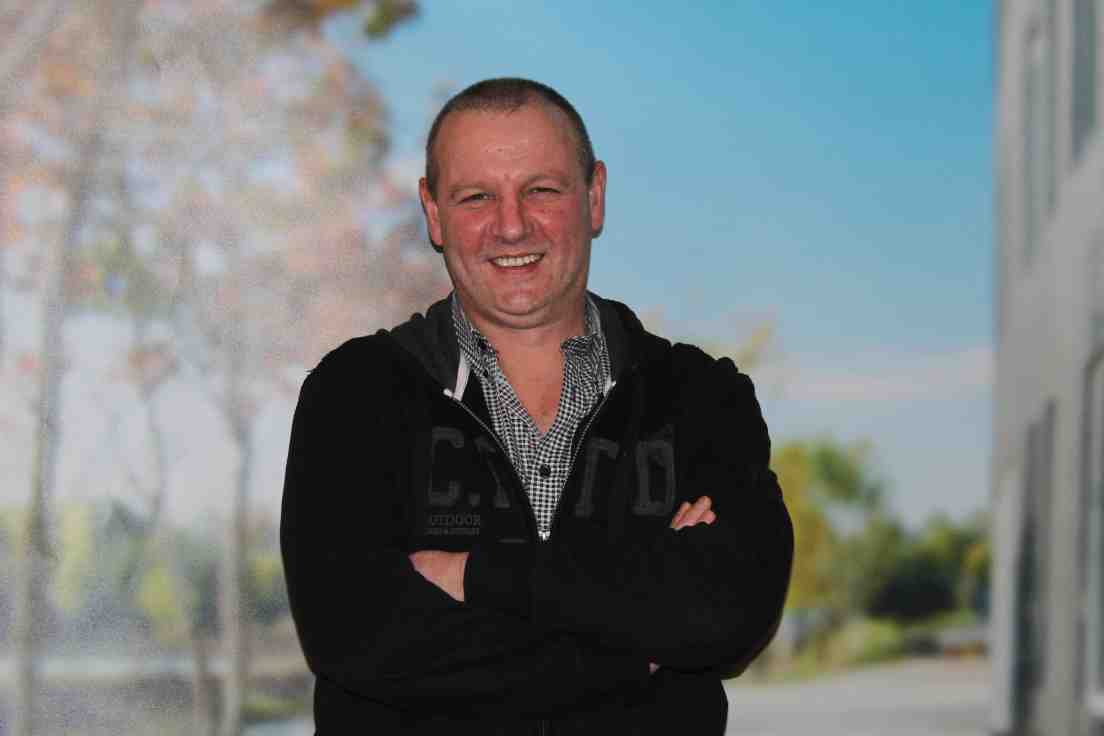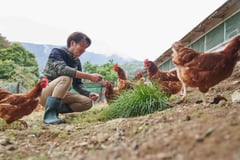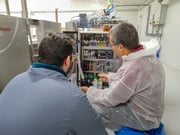"I was talking to a free-range farmer in the neighbourhood the other day. A fox saw all his tasty chickens going into the barn, so it decided to follow them. But when the barn was closed down, he had a hard time, being outnumbered of course. The farmer found him in a corner in the morning, he did not know how fast he had to leave when the doors opened again. He hadn't touched a chicken, haha." 
Gust Fleerakkers is poultry specialist at Vencomatic Group, he regularly gets questions from farmers about free-range. For instance about the feeding, but also about the feeding process: "Free range is subject to regulations, the shutters have to open in certain countries at 10.00 o'clock for instance. That has an impact on how you feed your chickens.
How is the feeding process different with free-range?
"If you want to sell free-range eggs, you will have to comply with rules on which you are monitored, for example about the opening. You depend on your outdoor conditions and have to assume summer conditions. A chicken goes inside when it gets dark, so your light has to change with the outside conditions."
"When the shutters open in the morning, not all hens have laid an egg yet. A laying hen drops some manure after waking up and goes in search of food and water, then they go into the nest to lay an egg. This usually happens within eight hours of waking, with a peak between the second and sixth hour."
When feeding, do you take this into account?
"In some countries there can be a maximum of 17 hours of light, the night period must be at least 7 hours. Chickens wake up around 6.00, then they get feed in the system. They have access to feed throughout the day, but you don't want to disturb them when they are laying. As soon as the doors open at 10.00, you try to keep them in with feed, as many hens have not laid their eggs by then."
"It also works the other way round: you use food to get the chickens inside at night. They sleep inside too, you can lure them in with light. As soon as it gets dark outside, the light in the house must be on to attract them. If they start to hide it becomes more difficult, some chickens are also surprised when the shutters are closed."
Do free-range chickens get different feed?
"The feed is the same, but often extra minerals are added to the feed to make sure they have stronger legs or better feathers. After all, they walk more. Sometimes calcium is added for stronger bones or better eggshell quality. Chickens nowadays can be kept for 100 weeks and lay 500 eggs, they are top athletes so everything must be in order. A bit of extra vegetables is not enough: it has to be a balanced feed, tailored to the quality of the production and the appearance of the hens.
Is there also free-range meat?
"Many marketing concepts have been developed for which the chickens live a little longer and move more relaxed towards their final weight. Outdoor runs are often part of such a concept; the concept chicken, for example, is raised under outdoor conditions."
"There are separate regulations for that again, there are even special breeds developed that are better suited to the outdoor environment of free-range. Regular broilers are too low on their feet and grow too fast. Vencomatic's X-Treck can make sure the quality of the chick is a bit better, so the productivity is higher and health is better."
Is the risk of salmonella greater with free range?
"The biggest risk of salmonella is in the feed, so the absolute risks are not higher with free-range. The basic feed is always provided by a feed manufacturer, there is a strict control of the feed. But the chance of contaminated material in the run is of course greater outside, inside you have everything more under control. If the chickens are cooped up, for example with bird diseases, there is no problem of course."
"In the past, chicken carcasses were often fed to other animals outside. Nowadays that doesn't happen anymore, because of the risks of contamination. Thanks to more knowledge and insight, everything has become much stricter regarding feed and nutrition. And that is a good development, of course.”







